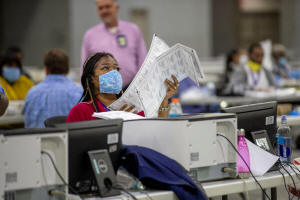Exclusive-Two election workers break silence after enduring Trump
backers' threats
 Send a link to a friend
Send a link to a friend
 [December 10, 2021]
By Linda So and Jason Szep [December 10, 2021]
By Linda So and Jason Szep
ATLANTA (Reuters) - Death threats from
angry Trump supporters forced Georgia election worker Ruby Freeman, a
62-year-old grandmother, to flee her home of 20 years. Some messages
called for her hanging; one urged people to “hunt” her. Freeman showed
hundreds of menacing messages to police and called 911 three times.
But a year after Donald Trump and his allies falsely accused Freeman -
along with her daughter and co-worker Wandrea “Shaye” Moss - of election
fraud, the threats have not been investigated by local police or state
authorities, according to a Reuters review of Georgia law enforcement
records. Federal agents have monitored some of the threats, but made no
arrests.
Offering the first detailed account of their ordeal, the two women told
Reuters about threats of lynching and racial slurs, along with alarming
visits by strangers to the homes of Freeman and her mother. The
intimidation began last December, a month after the 2020 election, when
the Trump campaign released surveillance video they falsely claimed
showed the two women, who are Black, opening “suitcases” full of phony
ballots to rig the vote count in predominantly Black Fulton County,
which includes part of Atlanta.
With no one arrested for threatening them, and no police security
detail, the women said their lives were thrown into chaos. Freeman told
Reuters she moved from house to house out of fear for her safety. Moss,
37, avoided leaving her home except for work and said she remains
wracked with anxiety and depression. Moss’s teenage son - also targeted
by threats and racist messages - started failing in school.

Their alarm peaked in January, Freeman said, when a Federal Bureau of
Investigation (FBI) agent told her a suspected Jan. 6 Capitol rioter had
been arrested and found in possession of a list of names of people to be
executed. Freeman and her daughter were on it, she said. The FBI
declined to comment on the incident.
Freeman showed hundreds of threatening emails and text messages to
police in Cobb County, where she lives, according to police reports
reviewed by Reuters. She visited the Fulton County police station on
Dec. 4, 2020, and told officers about the threats. While she was there,
her phone buzzed nonstop with menacing calls, and an unidentified
officer answered more than 20 of them, according to Freeman. In response
to Freeman’s at-times panicked emergency calls to 911, Cobb County
officers went to her home, according to a Reuters review of the call
recordings. But police officials did not open investigations into the
threats she faced, according to police records.
Among the uninvited visitors to Freeman’s home was a prominent Black
supporter of Trump, Trevian Kutti, who said she came to offer help. A
publicist for hip-hop artist and Trump supporter Kanye West, Kutti
warned Freeman that she’d be arrested soon on voting fraud charges and
sought to pressure her into confessing in exchange for help, Freeman
said. (West has since changed his name to “Ye.”)
Freeman said she ended the conversation. The episode made her wonder who
she could trust. She concluded: “Nobody.”
Parts of Freeman’s account of the meeting are corroborated by police
recordings reviewed by Reuters. Kutti did not respond to requests for
comment.
The family’s ordeal is an extreme example of a much broader paralysis in
U.S. law enforcement as election workers faced an unprecedented wave of
terroristic threats this year. In addition to the several hundred
threats described by Moss and Freeman, Reuters has documented more than
850 threats and harassing messages to election administrators, including
about 100 that legal experts say could be prosecuted under federal law.
Almost no one has been held accountable.

“There has to be charges brought against those threatening and
encouraging the threatening of election workers,” said Matt Masterson, a
Republican who ran election security at the U.S. Department of Homeland
Security between 2018 to 2020. “I don't see a way out of this without
real accountability being brought to bear.”
A spokesperson for Trump did not respond to requests for comment.
Reuters reported on the mother and daughter’s experience last week
through public records and interviews with their associates. The next
day, the two women filed a defamation lawsuit against The Gateway
Pundit, a far-right news site that published a series of false stories
accusing them of election fraud. The Gateway Pundit declined to comment.
For this story, the two women agreed to be interviewed on the condition
that the reporters not take photos, publish audio recordings of the
meeting or disclose where it took place. Both Moss and Freeman have
changed their appearances since their photographs were widely circulated
after the election; Reuters agreed not to describe how they look now.
After the threats started last December, the women grew desperate for
help. Freeman said she spoke with the Georgia Bureau of Investigation (GBI).
The bureau’s response was to show her how to make her Facebook page
private, she said. The GBI told Reuters that Georgia law only allows the
bureau to investigate if asked by police or another governing official,
which it said none did in the case of Freeman and Moss.
Freeman also spoke with the FBI. On Jan. 5, an agent recommended she
leave her home for her own safety, she said. The FBI also advised her to
change her phone number. The FBI had been monitoring threats to election
workers and contacted Freeman after discovering messages targeting her,
a former federal official told Reuters.
At the time, far-right users on Parler, a social media platform, were
calling for her execution. “She will go missing very soon,” one post
said. Another said she would be “suicided with 2 bullets to the back of
the head.” One urged fellow Trump supporters to “hunt her down.” Yet
another said: “Time for Ruby to die for what she believed in.”
Parler did not immediately respond to a request for comment on Thursday.
Making violent threats is a felony crime in Georgia when done with the
“purpose of terrorizing another.” Federal law criminalizes threats
explicit enough to put a reasonable person in fear of bodily harm or
death.

Police in Cobb County did not respond to requests for comment on why the
force did not investigate the hundreds of threats reported by Freeman.
Fulton County police said it did not investigate because the two women
did not make an official incident report to police. In addition to
Freeman telling Fulton County police about the threats, her supervisor
at the elections office asked the department for a security detail for
the two women. County government officials denied the request, saying
the threats against them did not rise to the level of crimes.
Law enforcement has been more aggressive in pursuing people who
threatened high-profile politicians. Police have arrested at least 12
people, almost all of them Trump supporters, who have threatened members
of the U.S. Congress since the 2020 election. Last month, a New York man
was arrested just days after allegedly making a death threat against
Congressman Andrew Garbarino, a New York Republican who voted for an
infrastructure bill that has been a priority of Democratic President Joe
Biden.
Threats against election workers should be taken just as seriously, said
Senator Amy Klobuchar, a Minnesota Democrat, who told Reuters she is
pressuring the U.S Department of Justice (DOJ) to act. “This is an
escalating problem,” said Klobuchar. “Law enforcement has to start
looking at these cases for what they are, which is a very threat to our
democracy.”
The DOJ said it “is fully committed to ensuring that all reported
incidents of threats of violence to election workers and officials are
carefully assessed for threat mitigation. That includes victim outreach
and FBI intervention, and when a matter does rise to the level of a
criminal threat, vigorously investigating the matter with all our
criminal tools and aggressively prosecuting the matter where
appropriate.”
While the people threatening Freeman and Moss got little scrutiny, the
election workers were investigated over Trump’s false fraud allegations
against them. Freeman said she met with investigators from the FBI, the
GBI, and officials from the Georgia secretary of state’s office to
answer questions about her work on Election Day. “They were trying to
figure out if we actually did steal ballots,” she said.
[to top of second column]
|

Fulton County employee Shaye Moss scans mail-in paper ballots at the
Georgia World Congress Center during the Georgia primary elections
in Atlanta, Georgia, U.S., June 9, 2020. Picture taken June 9, 2020.
Alyssa Pointer/Atlanta Journal-Constitution/Handout via REUTERS

On Dec. 4, a day after Trump’s allies publicly accused the women of
fraud, then-Attorney General Bill Barr asked Byung J. "BJay" Pak,
the U.S. attorney in Atlanta at the time, to look into the
allegations, according to two former federal officials with direct
knowledge of the matter. It wasn’t because Barr suspected the women
committed fraud, they said. State officials had already debunked
Trump’s claims. Rather, Barr wanted to be fully apprised so he could
respond to Trump’s inquiries, they added.
After that previously unreported discussion, FBI
agents spoke with Freeman and examined the surveillance video and
other evidence, concluding there was no fraud, the officials said.
By the time Barr stepped down on Dec. 23, he was confident there was
no wrongdoing, the former officials said. But Trump kept up pressure
on the DOJ, one of the sources said. Trump also continued to accuse
Moss and Freeman of fraud.
The FBI would not confirm or deny whether it is investigating
threats against the mother and daughter. Nationwide, just one person
has been arrested and charged with a federal crime involving threats
to election officials related to the 2020 presidential contest, a
woman accused last December of threatening an election official in
Michigan. That case is ongoing; the accused has pleaded not guilty.
In a statement, the FBI said it works with other agencies “to
identify and stop any potential threats to public safety” and
“investigate any and all federal violations to the fullest." After
Reuters reported the ongoing harassment of election officials and
their families in June, the DOJ announced a task force that month to
investigate threats to election workers.
A department spokesperson said the task force has “criminal
investigations open across the country.” The task force has yet to
announce any arrests.
COLLATERAL DAMAGE
Moss recalled the first time she saw the onslaught of threats, in
early December 2020. Shocked at the often violent and racist
messages, she said she was “just stuck and standing there for a
while.”
“And the first thing I thought about was my son,” Moss said.

The 14-year-old high school freshman was using her old cell phone,
with a number she had since college. He needed the device to connect
to the Internet for virtual learning during the coronavirus
pandemic, the only way he could get online. Moss earned a modest
$36,000 annually. She said she couldn’t afford WiFi.
As threats inundated her son’s phone, he couldn’t concentrate. His
grades slipped. Strangers battered him with threatening and racist
voicemails and texts.
One, she said, told him: “Be glad it’s 2020 and not 1920. You would
be hanging along with your mother.”
One threat shook her deeply. It said she had a “cute little boy,”
which she took as a veiled threat to his life.
Her only child was reluctant to tell her about the threats he
received. “He’s always tried to be my protector,” said the single
mother.
Instead, he started shutting down the phone to stop receiving the
threats, cutting off his only avenue to virtual learning. Moss
didn’t discover what he had been doing until May. By then he had
failed all of his classes, she said, and had to attend summer
school. When he returned for the next school year, the talented
football player couldn’t join the team. He had to focus on his
grades.
Before she became a target of Trump’s supporters, Moss said she
enjoyed being the outgoing face of the Fulton County elections
office, getting filmed for training videos and answering calls from
voters. She tucked her business card into the envelope of every
voter registration application she mailed out. When voters called
for help, she enjoyed talking to them.
Today, when her office phone rings, she’s afraid to answer and tries
to avoid giving her name. She rarely leaves her cubicle. Aside from
commuting, she avoids going out in public. She says she’s lost the
energy to cook, clean or walk the dog.
Her son helps out. When she’s overwhelmed by stress, he brings her
medicine and water.
“I can’t enjoy anything,” she said in a soft voice. “I just really
have lost myself.”
A WARNING FROM THE FBI
Like her daughter, Freeman was targeted with hundreds of threats and
racial slurs immediately after Trump’s team publicly accused her of
fraud on Dec. 3, 2020.

Over the next month, strangers showed up at Freeman's home,
sometimes banging on her door, according to Freeman and police
reports reviewed by Reuters.
When Kutti - the Kanye West publicist and Trump supporter - paid her
a visit, a wary Freeman called police and arranged to meet and talk
with Kutti at the Cobb County police station. Kutti told an officer
that Freeman “was in danger” and had “48 hours” to speak with her
before “unknown subjects” turned up at her home, according to a
police report.
The next day, Jan. 5, an FBI agent called Freeman and urged her to
leave her longtime home because it wasn’t safe, Freeman said.
“What do you mean, leave?” she recalls telling the agent. She says
she made quick arrangements to stay at a friend’s place.
The following day, on Jan. 6 - the day of the U.S. Capitol riots -
Kutti’s prediction that people would descend on Freeman’s home in 48
hours proved correct. Freeman fled hours before a mob of angry Trump
supporters surrounded her home, shouting through bullhorns,
according to the lawsuit Freeman and Moss filed last week against
the Gateway Pundit. Reuters was unable to independently corroborate
that incident.
Freeman left her friend’s home two weeks later, after finding out
about the arrested Capitol rioter who had Freeman and her daughter’s
names on a list. Her hosts grew worried for their own safety, she
said, so she packed up and got in her car the next morning. She
stayed in three different locations over the next six weeks, she
said.
By March, she returned home. She altered her appearance. But her
life had been upended, she said.
Some friends no longer spoke with her, out of fear, she said. Her
12-year-old clothing and accessories business, LaRuby's Unique
Treasures, has lost most of its customers, she said. Freeman
traveled around to sell her goods at events, often at churches or
sororities, Moss said. Regular clients didn’t know how to contact
her after she changed her phone number at the recommendation of the
FBI, and shuttered her social media accounts.

She now feels safer, she said. Eleven cameras and three motion
sensors have been installed around her home. But the experience -
life on the run, her daughter’s fears, her grandson’s school
struggles - has taken a toll on her family.
“All because of this?” she said, referring to Trump’s false claims
of mysterious suitcases stuffed with ballots. “That's not right.”
(Reporting by Linda So and Jason Szep; editing by Brian Thevenot)
[© 2021 Thomson Reuters. All rights
reserved.] Copyright 2021 Reuters. All rights reserved. This material may not be published,
broadcast, rewritten or redistributed.
Thompson Reuters is solely responsible for this content. |